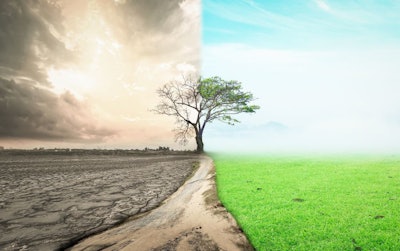
A panel of organic farmers addressed the challenges of farming in the time of climate change and emphasized how agriculture is in the best position to put people and planet first
Agricultural communities face an existential threat to their livelihoods and ability to maintain global food security as the impact of advancing climate change on an already vulnerable system grows more severe.
While modern agriculture contributes to the greenhouse gases fueling climate change, agriculture has the best position to lead the response toward a lasting solution, secure the future food supply and support the people who produce the world’s nutrition across the entire farming system. How are farmers navigating the challenges of farming in the time of climate change, and what do they need to succeed in this goal?
These questions kicked off the conversation of the keynote presentation and discussion during the Growing Stronger: Collaborative Conference on Organic & Sustainable Farming Conference held virtually by the Midwest Organic and Sustainable Education Service (MOSES) February 22-27. Three farmers shared their perspectives on the challenges of farming in the time of climate change: Jim Goodman, who operates an organic dairy and direct-market beef farm in Wisconsin; Erin Schneider, M.Ed., who co-owns Hilltop Community Farm and supports farmers as a Farmland Access Navigator for the Land Access Hub for Renewing the Countryside, a U.S. Department of Agriculture (USDA)-supported program that helps farmers acquire land tenure; and Lea Zeise, co-founder of Ohe.láku, an agricultural cooperative of Oneida families striving toward regenerative agriculture practices.
Addressing climate change requires resources
What we farm, how we farm, how we use our resources — these are just a few of the biggest issues at the forefront of farming and its effect on climate. Agriculture will need more resources to weather the challenges it faces and to achieve climate goals, and it is critical that policymakers shift federal agriculture investments to support any transition.
The Biden-Harris administration has identified that addressing climate change within agriculture is a priority, including increasing carbon sequestration in the agricultural sector; collecting input from farmers, ranchers, and other stakeholders on how to use federal programs to encourage adoption of climate-smart agricultural practices; and create new sources of income and jobs for rural Americans.
However, the panel resolved that farmers, by their nature of always being prepared to mitigate risk, already possess the force to compel change.
“We don’t need to wait for national action,” Zeise said. “Farmers have potential to become a very fierce constituency.”
The panel then discussed what resources agriculture needs to address climate change.
“The first resource we need to address is people,” Goodman said. “We need people to realize that climate change is real.” Despite a growing awareness for changing climate over the recent years, there is still a persistent misunderstanding about the difference in climate and weather, and the effect on the food supply, the panel explained.
Goodman, who farmed conventionally and then organically for more than 40 years, said that unless agriculture has the will to make some tough choices on its own, change isn’t going to happen as fast as it needs to.
“We need big, bold plans, and we need to follow through with them,” Goodman said.
The resources needed to address climate change are not just about sustainability and renewable energy, the panel explained. Action, both at a national level and within farming communities, is needed to get more people onto farms — more young people, women, immigrants, and more local farmers and processors. And once more farmers are producing food, it is critical to make sure they get paid fairly, have access to health care and farming programs to keep them on the land.
“Farming is tough economically. It’s hard to make a living in our current structure and system,” Schneider added.
Especially this past year, with the overlapping challenge of weather and a global pandemic disrupting global food systems.
“The way our food system works, it doesn’t take a lot to really disrupt it. Whether that’s through climate change from a farmer’s point of view or as we saw in the last year with the COVID” pandemic, Goodman said.
To change agriculture, society needs to change, stated the panel. And with the right tools, better technology, support and resources, it’s possible.
“The Stone Age didn’t end because we ran out of stones,” Zeise said. “We have the ability to decide to make different choices, even if it seems like those are the only tools in our toolbox.”
How farming can put people and planet first
It will take better cooperation among farming communities for agriculture to put people and the planet first, agreed the panel. But the will and power are there, as farmers are passionate about putting food on the table.
“There’s a lot of power we have in just being connected to each other, which isn’t something that is often talked about in agriculture or in technology — the power of people coming together to solve an issue,” Zeise said.
Agriculture and climate change are inextricably linked. Where farmers can collaborate their collective strengths, there is a solution, the panel agreed.
“Agriculture has immense power to change our relationship with the earth,” Zeise said, explaining that sustainability, regeneration and reciprocation are all ideas that already existed within the agricultural community. “The new technologies and buzz words are old ideas and old concepts that are remixed into a new way of doing agriculture.”
“Maybe the only way we can get to the future is to look back to the past and adopt some of the programs we had that actually worked,” Goodman agreed.
We have the capacity for meaningful connectiveness and empathy as our human strengths, concluded the panel. We have to look toward addressing climate change as farmers and critically evaluate proposed solutions, not only for their scientific merits, but also how these solutions impact equity and justice for urban, suburban and rural communities, on farms big and small.












